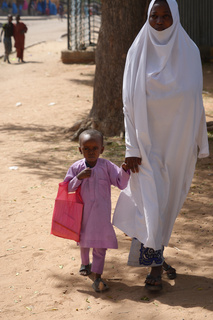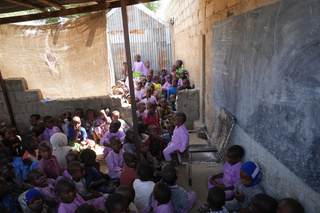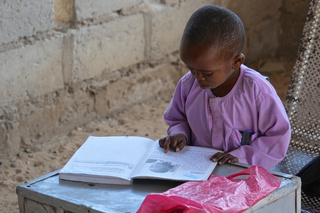share

Mahamadou, 13 years old, is studying hard to become a doctor. Maradi, Niger. | © J. Labeur / HI
Mahamadou is 13 years old and lives in Niger. He has an ambition: to become a doctor and save lives. HI is supporting him so that he can go to school in good conditions and fulfil his dreams.
Mahamadou Abdoulaye was born with a rare disease, commonly called dwarfism. At 13 years old, he is 0.86m tall. He has had to deal with a great deal of prejudice, but thanks to the unfailing support of his family and HI, he is now studying in adapted conditions.
 Mahamadou lives in Maradi with his grandmother, Zeinab Hajiya. For the past few years, his parents, Abdoulaye and Maimouna Hamada, have been living with his two little sisters in Zinder, a town about 300km away where Mahamadou regularly visits them. He stayed in Maradi to continue his education in the local school where he has been enrolled since he was five years old.
Mahamadou lives in Maradi with his grandmother, Zeinab Hajiya. For the past few years, his parents, Abdoulaye and Maimouna Hamada, have been living with his two little sisters in Zinder, a town about 300km away where Mahamadou regularly visits them. He stayed in Maradi to continue his education in the local school where he has been enrolled since he was five years old.
Throughout his childhood, Mahamadou was mocked and ridiculed by those around him. Certain traditional beliefs meant that some people regarded him as an imp, a dan ruwa – a genie which has taken the place of a child. His parents and grandmother tried in vain to protect him from this derision, at times even getting into fights with their neighbours.
 “Mahamadou used to be mocked in all sorts of ways by the pupils and even the local children. They would follow him so that they could pull his bag from behind. But thanks to HI’s Inclusive Education Project, an extensive programme of raising awareness about disability and inclusion has allowed the children to learn more about their fellow pupils with disabilities. Since then, Mahamadou and all the other children with disabilities have been accepted by their peers,” says his headteacher, Ramatou Hassan.
“Mahamadou used to be mocked in all sorts of ways by the pupils and even the local children. They would follow him so that they could pull his bag from behind. But thanks to HI’s Inclusive Education Project, an extensive programme of raising awareness about disability and inclusion has allowed the children to learn more about their fellow pupils with disabilities. Since then, Mahamadou and all the other children with disabilities have been accepted by their peers,” says his headteacher, Ramatou Hassan.
HI conducted awareness-raising campaigns in Mahamadou’s school and the local area. These campaigns have had a real impact: Mahamadou, who was sometimes discriminated against in certain activities, such as sport, is now experiencing fewer and fewer difficulties at school, at home and in his local area.
“I used to be mocked and teased in all sorts of ways, and some people even called me horrible names. Fortunately, since HI has been conducting awareness-raising activities in our school, I feel safer and better respected by my classmates,” says Mahamadou.
Today, Mahamadou has many friends among his classmates. He likes playing hide-and-seek and football for hours with them. But he loves sprinting more than anything else; and he always runs the fastest!
 Mahamadou loves going to school. He is now in CE2 and his favourite subjects are maths and history. So that he can be comfortable when studying, Mahamadou uses a table and chair adapted to his size – these were provided by HI. They are far more comfortable for him to work at than the standard desks which are too high, and his academic results reflect this: with 7.8/10 on average in the first term, Mahamadou is a very good student!
Mahamadou loves going to school. He is now in CE2 and his favourite subjects are maths and history. So that he can be comfortable when studying, Mahamadou uses a table and chair adapted to his size – these were provided by HI. They are far more comfortable for him to work at than the standard desks which are too high, and his academic results reflect this: with 7.8/10 on average in the first term, Mahamadou is a very good student!
“Mahamadou is now highly regarded by his classmates, not just thanks to the awareness-raising programme but also thanks to his academic performance, which has earned him the admiration of those around him. Everyone wants to be his friend,” says Ramatou Hassan.
“The support from my teachers has given me new hope and I intend to continue my studies to show everyone that disability is not the end of the world! I want to become a doctor, so that I can save lives!”, says Mahamadou enthusiastically.
HI’s Inclusive Education Project in Maradi is funded with the support of the Luxembourg Ministry of Foreign Affairs, NORAD and UNICEF. Since it was launched in 2017, it has provided more than 80 schools with adapted teaching materials, identified nearly 5,000 children with disabilities for personalised support, and trained nearly 600 teachers in inclusive education, sign language and Braille. In addition, 380 parents have been informed about deafness and introduced to sign language, and nearly 50,000 parents and community members have been informed about and trained in disability and inclusive education. 260 actors from the public service and professional communities have also been informed about how to welcome people with disabilities. Finally, 35 education advisors have been trained, and 80 young people with disabilities have received adapted vocational training.








HI is an independent and impartial aid organisation working in situations of poverty and exclusion, conflict and disaster. We work alongside people with disabilities and vulnerable populations, taking action and bearing witness in order to respond to their essential needs, improve their living conditions and promote respect for their dignity and fundamental rights.
HI is an independent and impartial aid organisation working in situations of poverty and exclusion, conflict and disaster. We work alongside people with disabilities and vulnerable populations, taking action and bearing witness in order to respond to their essential needs, improve their living conditions and promote respect for their dignity and fundamental rights.